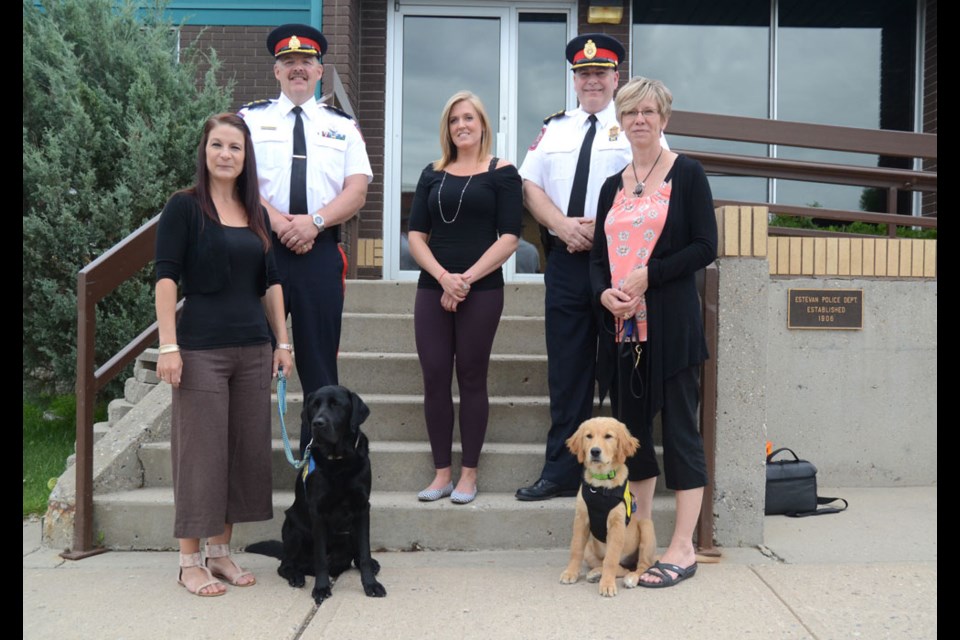Southeast Saskatchewan will now have access to a working dog dedicated to helping victims cope with traumatic events, and the dog couldn't be happier.
Tara Busch, victim services co-ordinator for Southeast Regional Victim Services, said whenever she is called out to help a person who has lost a loved one, or assist a child with delivering a statement after a traumatic event, she won't be going alone.
"He's my new partner," Busch said, while patting Beaumont, a two-year-old chocolate Labrador on the head.
Members of the Pacific Assistance Dogs Society (PADS) and Southeast Regional Victims Services, at the Estevan Police Service, made the official announcement on June 24. Joining them was Beaumont, who recently graduated from PADS' assistance dog training program. EPS police Chief Paul Ladouceur and Weyburn police Chief Marlo Pritchard, were also on hand for the announcement.
"We've just learned that there are things that these dogs can do that humans can't," Busch said.
She noted humans have the ability to try and calm people down in stressful situations, but stressed a dog's ability to effectively calm someone down in even the most intense situations.
"They help normalize those situations," she said.
Tara Dong, communication manager for PADS, said children often don't want to talk to adults when making a statement to police.
"They're in a moment of trauma and don't want to tell adults how they feel or give them details," Dong said. "They can tell dogs the story ... no one will think that child was led on by someone or forced to say something they didn't want to."
Laura Watamanuk, executive director for PADS, said a lot of their clients have been adults, too. She recounted a couple who had lost a daughter, adding the couple was able to cope with the situation because of an assistance dog.
Ladouceur said police have been giving out stuffed animals and cuddly blankets to victims of crime or traumatic events for a long time, but admitted a dog is the ultimate tool in those situations.
"There's a natural attraction to dogs," he said. "We reap the benefits but we certainly can't take any of the credit," he added, referring to victim services' ability to focus on assisting victims directly while police continue with the investigation.
Beaumont was not the only dog at the press conference. Cadence, a three-and-a-half-month old golden retriever was also present. She was taking in the sights and getting a brief glimpse of the individuals and communities she might potentially serve one day as an assistance dog.
"Right now, this is more of an exposure role for her," Busch said.
Watamanuk said a very specific program is in place that breeds and properly trains assistance dogs, to the point where they can handle high-stress situations and even identify individuals who are in a state of high stress. Training begins when puppies reach the age of eight weeks.
Regular follow up training is also required for both handlers and dogs.
PADS is working on expanding their services to the courts, where assistance dogs can be used to assist a child making a statement. Watamanuk said PADS has been lobbying for over two years to get dogs into the courthouse. She said those efforts have been successful in Alberta.
PADS has nearly 90 dogs in various stages of training, and the three in Saskatchewan, including Beaumont, are ready for action immediately.




